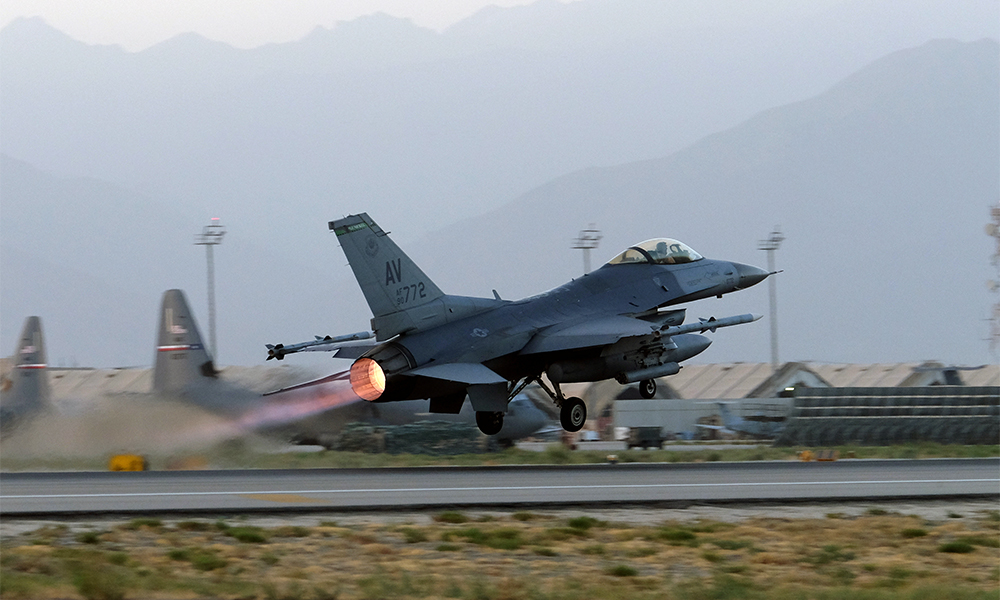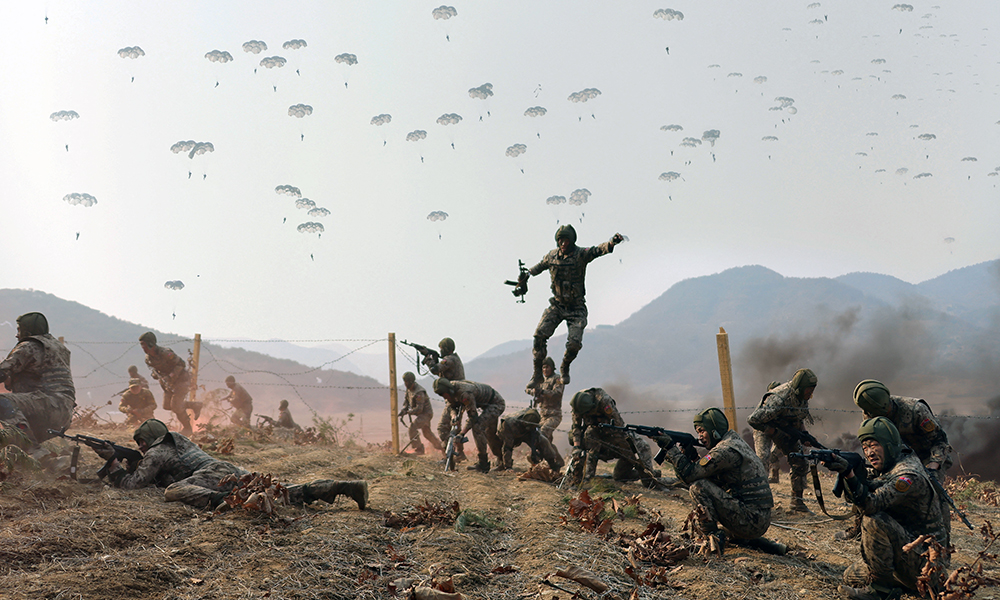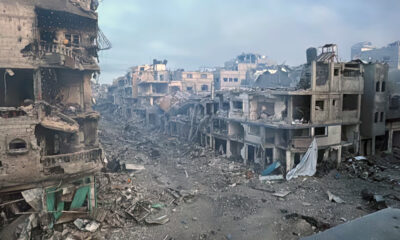World
US military brings down flying object over Lake Huron

US military fighter jets on Sunday shot down an octagonal object over Lake Huron, the Pentagon said, the latest incident since a suspected Chinese surveillance balloon put North American security forces on high alert, Reuters reported.
It was the fourth flying object to be shot down over North America by a US missile in a little more than a week.
US Air Force General Glen VanHerck, who is tasked with safeguarding US airspace, told reporters that the military has not been able to identify what the three most recent objects are, how they stay aloft, or where they are coming from.
"We're calling them objects, not balloons, for a reason," VanHerck, head of North American Aerospace Defense Command (NORAD) and Northern Command, said.
VanHerck said he would not rule out aliens or any other explanation.
"I'll let the intel community and the counterintelligence community figure that out," he said.
Another defense official, speaking on condition of anonymity, subsequently said the military had not seen any evidence that the objects were extraterrestrial.
On President Joe Biden's order, a US F-16 fighter shot down the object at 2:42 p.m. local time over Lake Huron on the US-Canada border, Pentagon spokesperson Brigadier General Patrick Ryder said in an official statement.
Though it did not pose a military threat, the object could have potentially interfered with domestic air traffic as it was traveling at 20,000 feet (6,100 m), and it might have had surveillance capabilities, Ryder said.
The object appeared to be octagonal in structure, with strings hanging off but no discernible payload, said a US official speaking on condition of anonymity.
The object was believed to be the same as one recently detected over Montana near sensitive military sites, prompting the closure of US airspace, the Pentagon said. The military will try to recover the object downed over Lake Huron to learn more about it, VanHerck told reporters.
He said it likely fell into Canadian waters.
The incident raised questions about the spate of unusual objects that have appeared over North American skies in recent weeks and raised tensions with China.
"We need the facts about where they are originating from, what their purpose is, and why their frequency is increasing," said US Representative Debbie Dingell, one of several Michigan lawmakers who applauded the military for downing the object.
US officials identified the first object as a Chinese surveillance balloon and shot it down off the coast of South Carolina on Feb. 4. On Friday, a second object was shot down over sea ice near Deadhorse, Alaska. And a third object was destroyed over Canada's Yukon on Saturday, with investigators still hunting for the wreckage, Reuters reported.
"The security of citizens is our top priority and that's why I made the decision to have that unidentified object shot down," Prime Minister Justin Trudeau told reporters on Sunday.
North America has been on guard against aerial intrusions following the appearance of the white, eye-catching Chinese airship over American skies earlier this month.
That 200-foot-tall (60-meter-high) balloon - which Americans have accused Beijing of using to spy on the United States - caused an international incident, leading Secretary of State Antony Blinken to call off a planned trip to China only hours before he was set to depart.
Pentagon officials said they have been scrutinizing radar more closely since then.
Surveillance fears appear to have US officials on high alert.
Twice in 24 hours, US officials closed airspace - only to reopen it swiftly.
On Sunday, the Federal Aviation Administration briefly closed space above Lake Michigan. On Saturday, the US military scrambled fighter jets in Montana to investigate a radar anomaly there.
China denies the first balloon was being used for surveillance and says it was a civilian research craft. It condemned the United States for shooting it down off the coast of South Carolina last Saturday, read the report.
US Senate Majority Leader Chuck Schumer told US broadcaster ABC that US officials think two of the latest objects were smaller balloons than the original one.
The White House said only that the recently downed objects "did not closely resemble" the Chinese balloon, echoing Schumer's description of them as "much smaller."
"We will not definitively characterize them until we can recover the debris, which we are working on," a spokesperson said.
DEBRIS IN REMOTE LOCALE
Canadian counterparts trying to piece together what was shot down over the Yukon may have their own challenges. The territory is a sparsely populated region in Canada's far northwest, which borders Alaska. It can be brutally cold in the winter, but temperatures are unusually mild for this time of year, which could ease the recovery effort.
Republican lawmaker Mike Turner, who serves on the US House Armed Services Committee, suggested the White House might be overcompensating for what he described as its previously lax monitoring of American airspace.
"They do appear somewhat trigger-happy," Turner told CNN on Sunday. "I would prefer them to be trigger-happy than to be permissive."
Republicans have criticized the Biden administration over its handling of the incursion by the suspected Chinese spy balloon, saying it should have been shot down much earlier.
World
North Korean troops suffer 100 deaths, struggling in drone warfare, South Korea says
More than 10,000 North Korean troops have been deployed to help Russia in the war, according to U.S. and South Korean officials.

At least 100 North Korean troops deployed to Russia have been killed with another 1,000 injured in combat against Ukrainian forces in intense fighting in the Kursk region, Reuters cited a South Korean lawmaker said on Thursday citing the country's spy agency.
The heavy losses are attributed to the lack of experience by North Korean troops in drone warfare and unfamiliarity with the open terrain where they are taking part in the battle, a member of parliament Lee Seong-kweun told reporters.
Lee was speaking after a closed-door briefing by the National Intelligence Service (NIS) to parliament.
The discrepancy in the estimate of the troops killed from that made by a U.S. military official who cited several hundred casualties is because of the relatively conservative analysis by the NIS, Lee said.
"There was a report that there have been at least 100 deaths and the injured are approaching 1,000," he said.
There are indications that the North is preparing for additional deployment, Lee said, including intelligence of the country's leader Kim Jong Un overseeing training, read the report.
The report echoed comments by U.S. and Ukrainian officials that North Korean losses are heavy and that Russia was using them in large numbers in assaults in Kursk, a Russian region where Ukraine launched a cross-border incursion in August.
More than 10,000 North Korean troops have been deployed to help Russia in the war, according to U.S. and South Korean officials. Pyongyang has also shipped more than 10,000 containers of artillery rounds, anti-tank rockets as well as mechanised howitzers and rocket launchers.
Neither the North nor Russia have officially acknowledged the troop deployment or the weapons supply.
Russian President Vladimir Putin visited Pyongyang in June and signed a "comprehensive strategic partnership" treaty with North Korean leader Kim Jong Un that included a mutual defence pact.
Earlier on Thursday, North Korea said its military alliance with Russia is proving "very effective" in deterring the United States and its "vassal forces," denouncing a recent statement by Washington and allies against ties between Pyongyang and Moscow, Reuters reported.
North Korea made no mention of its involvement in the war in Ukraine or casualties.
Instead it denounced a statement by the United States and nine countries and the European Union issued on Monday as "distorting and slandering the essence of the normal cooperative relations" between the North and Russia.
In a statement by an unnamed foreign ministry spokesman, the North blamed Washington and its allies for prolonging the Ukrainian war and destabilising the security situation in Europe and Asia-Pacific.
"It is because of the misguided acts of the U.S. and the West persisting in their structure-destructive, hegemony-oriented and adventuristic military policy," it said.
World
NATO takes over coordination of military aid to Kyiv from US, source says
Trump, who will take office in January, has said he wants to end the war in Ukraine swiftly but not how he aims to do so. He has long criticised the scale of U.S. financial and military aid to Ukraine, read the report.

NATO has taken over coordination of Western military aid to Ukraine from the U.S. as planned, a source said on Tuesday, in a move widely seen as aiming to safeguard the support mechanism against NATO sceptic U.S. President-elect Donald Trump, Reuters reported.
The step, coming after a delay of several months, gives NATO a more direct role in the war against Russia's invasion while stopping well short of committing its own forces.
Diplomats, however, acknowledge that the handover to NATO may have a limited effect given that the U.S. under Trump could still deal a major setback to Ukraine by slashing its support, as it is the alliance's dominant power and provides the majority of arms to Kyiv.
Trump, who will take office in January, has said he wants to end the war in Ukraine swiftly but not how he aims to do so. He has long criticised the scale of U.S. financial and military aid to Ukraine, read the report.
The headquarters of NATO's new Ukraine mission, dubbed NATO Security Assistance and Training for Ukraine (NSATU), is located at Clay Barracks, a U.S. base in the German town of Wiesbaden.
A person familiar with the matter told Reuters it was now fully operational. No public reason has been given for the delays.
NATO's military headquarters SHAPE said its Ukraine mission was beginning to assume responsibilities from the U.S. and international organizations.
"The work of NSATU ... is designed to place Ukraine in a position of strength, which puts NATO in a position of strength to keep safe and prosperous its one billion people in both Europe and North America," said U.S. Army General Christopher G. Cavoli, the Supreme Allied Commander Europe.
"This is a good day for Ukraine and a good day for NATO."
In the past, the U.S.-led Ramstein group, an ad hoc coalition of some 50 nations named after a U.S. air base in Germany where it first met, has coordinated Western military supplies to Kyiv.
Trump threatened to quit NATO during his first term as president and demanded allies must spend 3% of national GDP on their militaries, compared with NATO's target of 2%.
Meanwhile, the outgoing Biden administration in Washington is scrambling to ship as many weapons as possible to Kyiv amid fears that Trump may cut deliveries of military hardware to Ukraine.
NSATU is set to have a total strength of about 700 personnel, including troops stationed at NATO's military headquarters SHAPE in Belgium and at logistics hubs in Poland and Romania, read the report.
Russia has condemned increases in Western military aid to Ukraine as risking a wider war.
World
At least 100,000 bodies in Syrian mass grave, US advocacy group head says

The head of a U.S.-based Syrian advocacy organization on Monday said that a mass grave outside of Damascus contained the bodies of at least 100,000 people killed by the former government of ousted President Bashar al-Assad.
Mouaz Moustafa, speaking to Reuters in a telephone interview from Damascus, said the site at al Qutayfah, 25 miles (40 km) north of the Syrian capital, was one of five mass graves that he had identified over the years.
"One hundred thousand is the most conservative estimate" of the number of bodies buried at the site, said Moustafa, head of the Syrian Emergency Task Force. "It's a very, very extremely almost unfairly conservative estimate."
Moustafa said that he is sure there are more mass graves than the five sites, and that along with Syrians victims included U.S. and British citizens and other foreigners.
Reuters was unable to confirm Moustafa's allegations.
Hundreds of thousands of Syrians are estimated to have been killed since 2011, when Assad's crackdown on protests against his rule grew into a full-scale civil war.
Assad and his father Hafez, who preceded him as president and died in 2000, are accused by Syrians, rights groups and other governments of widespread extrajudicial killings, including mass executions within the country's notorious prison system.
Assad repeatedly denied that his government committed human rights violations and painted his detractors as extremists.
Syria's U.N. Ambassador Koussay Aldahhak did not immediately respond to a request for comment. He assumed the role in January - while Assad was still in power - but told reporters last week that he was awaiting instructions from the new authorities and would "keep defending and working for the Syrian people."
Moustafa arrived in Syria after Assad flew to Russia and his government collapsed in the face of a lightning offensive by rebels that ended his family's more than 50 years of iron-fisted rule.
He spoke to Reuters after he was interviewed at the site in al Qutayfah by Britain's Channel 4 News for a report on the alleged mass grave there.
He said the intelligence branch of the Syrian air force was "in charge of bodies going from military hospitals, where bodies were collected after they'd been tortured to death, to different intelligence branches, and then they would be sent to a mass grave location."
Corpses also were transported to sites by the Damascus municipal funeral office whose personnel helped unload them from refrigerated tractor-trailers, he said.
"We were able to talk to the people who worked on these mass graves that had on their own escaped Syria or that we helped to escape," said Moustafa.
His group has spoken to bulldozer drivers compelled to dig graves and "many times on orders, squished the bodies down to fit them in and then cover them with dirt," he said.
Moustafa expressed concern that graves sites were unsecured and said they needed to be preserved to safeguard evidence for investigations.
-

 Latest News5 days ago
Latest News5 days agoAfghanistan seals T20I series victory over Zimbabwe
-

 World5 days ago
World5 days agoSyrian clerics in former Assad stronghold call for national unity, democracy
-

 International Sports4 days ago
International Sports4 days agoMessi vs Ronaldo: A look at their market values over the years
-

 Latest News5 days ago
Latest News5 days agoU.S. sentences Afghan man to 30 years in prison for narco-terrorism and witness tampering
-

 Latest News5 days ago
Latest News5 days agoInvestment in Afghanistan’s pharmaceutical sector reaches $300 million: Union
-

 Latest News5 days ago
Latest News5 days agoChinese, Tajik officials discuss Afghanistan
-

 Sport5 days ago
Sport5 days agoAfghanistan’s Gulbaddin Naib fined 15% of match fee for dissent
-

 Regional4 days ago
Regional4 days agoHezbollah chief says group lost its supply route through Syria
























